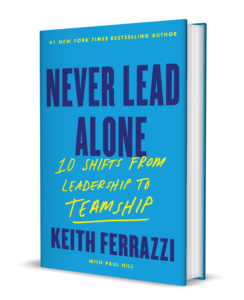My new book — Never Eat Alone: And Other Secrets to Success, One Relationship at a Time — was recently released by Currency/Doubleday. In Never Eat Alone, I expose many secrets behind the success of so many accomplished people. Most of these secrets involve the power of relationships and how we all can succeed best in business and in life by contributing to the success of others. The mindset and techniques that have helped me meet and connect with so many amazing people, all of which have meant everything to my professional success and personal joy, are distilled into 31 simple and fun chapters that are easy to read and to follow.
The following excerpt is from Never Eat Alone‘s Chapter 15: “Connecting with Connectors.” In this chapter, I discuss super-connectors. You know who I’m talking about. They’re the people who make possible “the strength of weak ties,” they know and connect people from all walks of life, and they’re essential to growing your network — whatever your mission in life. I even give a quick rundown of seven professions in which you’ll find natural super-connectors. Learn the unique talents of each and how best to get on their radar screens, and you just might become a super-connector in your own right!
Chapter 15: Connecting with Connectors
It has become part of our accepted wisdom that six degrees is all that separates us from anyone else in the world. How can that be? Because some of those degrees (people) know many, many more people than the rest of us.
Call them super-connectors. We all know at least one person like this individual, who seems to know everybody and who everybody seems to know. You’ll find a disproportionate amount of super-connectors as headhunters, lobbyists, fundraisers, politicians, journalists, and public relations specialists, because such positions require these folks’ innate abilities. I am going to argue that such people should be the cornerstones to any flourishing network.
What Michael Jordan was to the basketball court, or Tiger Woods is to golf, these people can be to your network. So who are they, really, and how can you get them to become prized members of your circle of associates and friends?
In his bestselling book The Tipping Point, Malcolm Gladwell cites a classic 1974 study by sociologist Mark Granovetter that surveyed how a group of men in Newton, Massachusetts, found their current job. The study, appropriately titled “Getting a Job,” has become a seminal work in its field, and its findings have been confirmed over and over again.
Granovetter discovered that 56 percent of those surveyed found their current job through a personal connection. Only 19 percent used what we consider traditional job-searching routes, like newspaper job listings and executive recruiters. Roughly 10 percent applied directly to an employer and obtained the job.
My point? Personal contacts are the key to opening doors — not such a revolutionary idea.What is surprising, however, is that of those personal connections that reaped dividends for those in the study, only 17 percent saw their personal contact often — as much as they would if they were good friends — and 55 percent saw their contact only occasionally.And get this, 28 percent barely met with their contact at all.
In other words, it’s not necessarily strong contacts, like family and close friends, that prove the most powerful; to the contrary, often the most important people in our network are those who are acquaintances.
As a result of the study, Granovetter immortalized the phrase “the strength of weak ties” by showing persuasively that when it comes to finding out about new jobs — or, for that matter, new information or new ideas — “weak ties” are generally more important than those you consider strong.Why is that? Think about it.
Many of your closest friends and contacts go to the same parties, generally do the same work, and exist in roughly the same world as you do. That’s why they seldom know information that you don’t already know.
Your weak ties, on the other hand, generally occupy a very different world than you do. They’re hanging out with different people, often in different worlds, with access to a whole inventory of knowledge and information unavailable to you and your close friends.
Mom was wrong—it does pay to talk to strangers. As Malcolm Gladwell wrote, “Acquaintances, in short, represent a source of social power, and the more acquaintances you have, the more powerful you are.”
Throughout this book, I try to emphasize that what’s most important is developing deep and trusting relationships, not superficial contacts. Despite Granovetter’s research, I believe friendships are the foundation for a truly powerful network. For most of us, cultivating a lengthy list of mere acquaintances on top of the effort devoted to your circle of friends is just too draining. The thought of being obligated to another hundred or so people — sending birthday cards, dinner invites, and all that stuff that we do for those close to us—seems outlandishly taxing.
Only, for some, it’s not. These people are super-connectors. People like me who maintain contact with thousands of people. The key, however, is not only that we know thousands of people but that we know thousands of people in many different worlds, and we know them well enough to give them a call. Once you become friendly with a super-connector, you’re only two degrees away from the thousands of different people we know.
A social psychologist by the name of Dr. Stanley Milgram proved this idea in a 1967 study.He ran an experiment that set out to show that our big, impersonal world is actually quite small and friendly.
It was Milgram’s experiment that created the notion of “six degrees of separation.” In the experiment, he sent a package to a few hundred randomly selected people in Nebraska with the instructions that they forward the package to an anonymous stockbroker in Boston whom they did not know. Each person could send the packet only to someone whom they knew on a firstname basis, and who they thought was more likely to know the stockbroker than they were themselves. About a third of the letters reached their destination, after an average of only six mailings.
What was surprising was that when all those chains of people were analyzed, Milgram found that a majority of the letters passed through the hands of the name three Nebraskans. The finding drives home the point that if you want access to the social power of acquaintances, it helps to know a few super-connectors.
Connectors can be found in every imaginable profession, but I’m going to focus on seven professions where they most commonly congregate. Each of these kinds of connectors provides me with a link to an entire world of people, ideas, and information that, in a very significant way, has made my own life a little more fun, helped my career along, or made the businesses I worked for more successful.
1. Restaurateurs
Fifty-seventh Street isn’t exactly lower Manhattan, but it was downtown to Jimmy Rodriguez, the nightlife impresario who made the Bronx hip for the A-list with his first eatery. Jimmy’s Downtown, his second restaurant, lured the same set of celebrities, politicians, and athletes looking for good food and good times.
When I was in New York, it was my spot. The scene was exclusive without being pompous: soft light, a gleaming onyx bar, and a pumping R&B soundtrack makes the place feel like a hip country club. Jimmy would fly around tables hooking you up with free appetizers and introducing you to people he thought you might want to meet.
It was like a private club, without membership dues.
My memories of Jimmy were of a true-blue connector. In fact, it’s a requisite for most people who own restaurants.When I was in Chicago, it was Gordon’s Restaurant, and in L.A., it is Wolfgang Puck. The success of their enterprise depends on a core group of regulars who see the restaurant as a home away from home.
And it’s quite easy to get to know a restaurateur. The smart ones will go out of their way to make your experience delightful. All you have to do is reach out and go there often enough.
When in a new city, I generally ask people to give me a list of a few of the hottest (and most established) restaurants. I like to call ahead and ask to speak with the owner (though the maître d’ will do) and tell them that I go out regularly, sometimes in large parties, and I’m looking for a new place to entertain, a lot!
If you don’t go out as often as I do, find one or two restaurants that you enjoy and frequent them when you do go out. Become a regular.Make a point of meeting the staff.When you’re entertaining for work, bring others there.When you have to cater an event, use them.
Once you get to know the owner, it’ll become like your very own restaurant — a place that has the patina of exclusivity and cachet a private club imparts with all the warmth and comfort of your own home.
With some advance planning and a little loyalty, a restaurateur will not only share the bounty of his kitchen with you but introduce you to his other roster of clients as well.
2. Headhunters
Recruiters. Job-placement counselors. Search executives. They are like gatekeepers. Instead of answering to one executive, however, the really successful ones may answer to hundreds of executives in the field in which they recruit.
Headhunters are professional matchmakers, earning their wage by introducing job candidates to companies that are hiring. Should you get the job, the headhunter gets a sizable commission, typically a percentage of the successful candidate’s first year’s compensation.
As a result, headhunters are an interesting blend of salesman and socialite. To find candidates, headhunters often place job ads. They also contact likely candidates directly, perhaps on the referral of a friend or colleague. In the industries in which they specialize, they become invaluable resources of names and information.
The sweet spot for a headhunter revolves around two issues. You’re either hiring them to do a search or you’re helping them do a search on behalf of someone else. If you’re in the market for a job, let as many search firms as are willing hit the phones for you.
I keep a file of headhunters: who they are and what they’re looking for. And I return every call from them, helping to tap my network to find people for their jobs. I know they’ll help me with access to some of their clients when I need their help. After all, they are in the networking business!
Can anyone contact a headhunter? To be honest, headhunters prefer to be the one contacting you. But if you’re careful about not trying to sell yourself before you offer up the network of contacts you can provide to them, they’ll be receptive. In the early years of my career, when I was not in the position of hiring them and didn’t know people who were using search consultants, I would ask pointedly,”What searches are you working on? How can I help you find people?”
The other advice in this area is to act as a pseudo-headhunter yourself, always on the lookout to connect job-hunters and jobseekers or consultants and companies.When you help people land a new gig, they’ll be inclined to remember you if they hear of a new position opening. Moreover, if you help, say, a vendor of yours land a new client, they’ll usually be more open to negotiating prices on your next project.Helping others find good employees is a real currency.
3. Lobbyists
Well informed, persuasive, and self-confident, lobbyists are generally impressive networkers.
By virtue of their job, they are intimately familiar with the ways of large organizations and how local and national government work. They are almost uniformly passionate people whose goal is to sway politicians to vote on legislation in a way that favors the interest they represent.
How do they work? Lobbyists will often host cocktail parties and dinner get-togethers, allowing them to interact with politicians — and their opponents — in a casual atmosphere. Their more grassroots efforts involve long hours spent on the phone and in writing letters, trying to rouse the community to get involved behind an issue. All of which makes them a rather easy group to please. Can you hold an event for them? Volunteer your services? Refer other volunteers to their cause? Introduce them to potential clients?
Lobbyists tend to bump up against a lot of people who it might be helpful to know, including those who are powerful and successful.
4. Fundraisers
“Follow the money” are words fundraisers live by. They know where it is, what it will take to get it, and most important, who’s most likely to give it away. As a result, fundraisers, whether they work for a political organization, university, or nonprofit group,tend to know absolutely everybody. And while they have the unenviable job of trying to convince people every day to part with their well-earned money, they are almost always incredibly well liked. It’s a selfless job often done for the best of reasons, and most people recognize that anyone who has a good friend who is a fundraiser has an open door to a whole new world of contacts and opportunities.
5. Public relations people
PR people spend their whole day calling, cajoling, pressuring, and begging journalists to cover their clients. The relationship between media and PR is an uneasy one, but at the end of the day, necessity brings them together like long-lost cousins.
A good friend who works in PR can be your entrée into the world of media and, sometimes, celebrity. Elana Weiss, who coleads the PR firm I used called The Rose Group, introduced me to Arianna Huffington (through someone she knew in her office), the noted author and political columnist. Arianna has since become a friend and confidante and one of the dazzling lights at my dinner parties in L.A.
6. Politicians
Politicians at every level are inveterate networkers. They have to be. They shake hands, kiss babies, give speeches, and go to dinners, all in the name of gaining the trust of enough people to get elected. The stature of politicians is derived from their political power rather than their wealth.Anything you can do to help them gain power with voters, or exercise power in office, will go a long way to ensuring you a place in their inner circle.
What can a politician do for you? Local city hall politicians can be key to working through the thicket of local governmental bureaucracy. And politicians at any level, if successful, are celebrities — and their networks reflect that.
How can you reach out? Join your local Chamber of Commerce. Local executives, businesspeople, and entrepreneurs generally populate the Chamber. In every community, there are plenty of young politicos looking to climb the political ladder. Early on, before their rise to prominence, you can engender a lot of loyalty and trust by supporting their goals and chipping in when they decide to run for office.
7. Journalists
Journalists are powerful (the right exposure can make a company or turn a nobody into a somebody), needy (they’re always looking for a story), and relatively unknown (few have achieved enough celebrity to make them naccessible).
For years, since I was back at Deloitte, I’ve called on journalists at different magazines, taking them to dinners and pumping them full of good story ideas. I now know people in top positions at almost every major business magazine in the country. Which is one of the reasons why in less than a year after I took over YaYa, with barely a shred of revenue to its name, the company—and, more important, the idea YaYa was trying to sell—appeared in publications like Forbes, the Wall Street Journal, CNN, CNBC, Brand Week, Newsweek, the New York Times… the list goes on.
These are seven different professions tailor-made for superconnectors. Reach out to some. And there are others—lawyers, brokers, etc. Become a part of their network and have them become a part of yours. Cut the umbilical cord to the folks around the office water cooler. Mix it up. Hunt out people who look and act and sound nothing like you do. Seek out ideas from people you don’t ordinarily talk to who inhabit professional worlds you don’t ordinarily travel in.
In one word: Connect. In four better words: Connect with the connectors.






